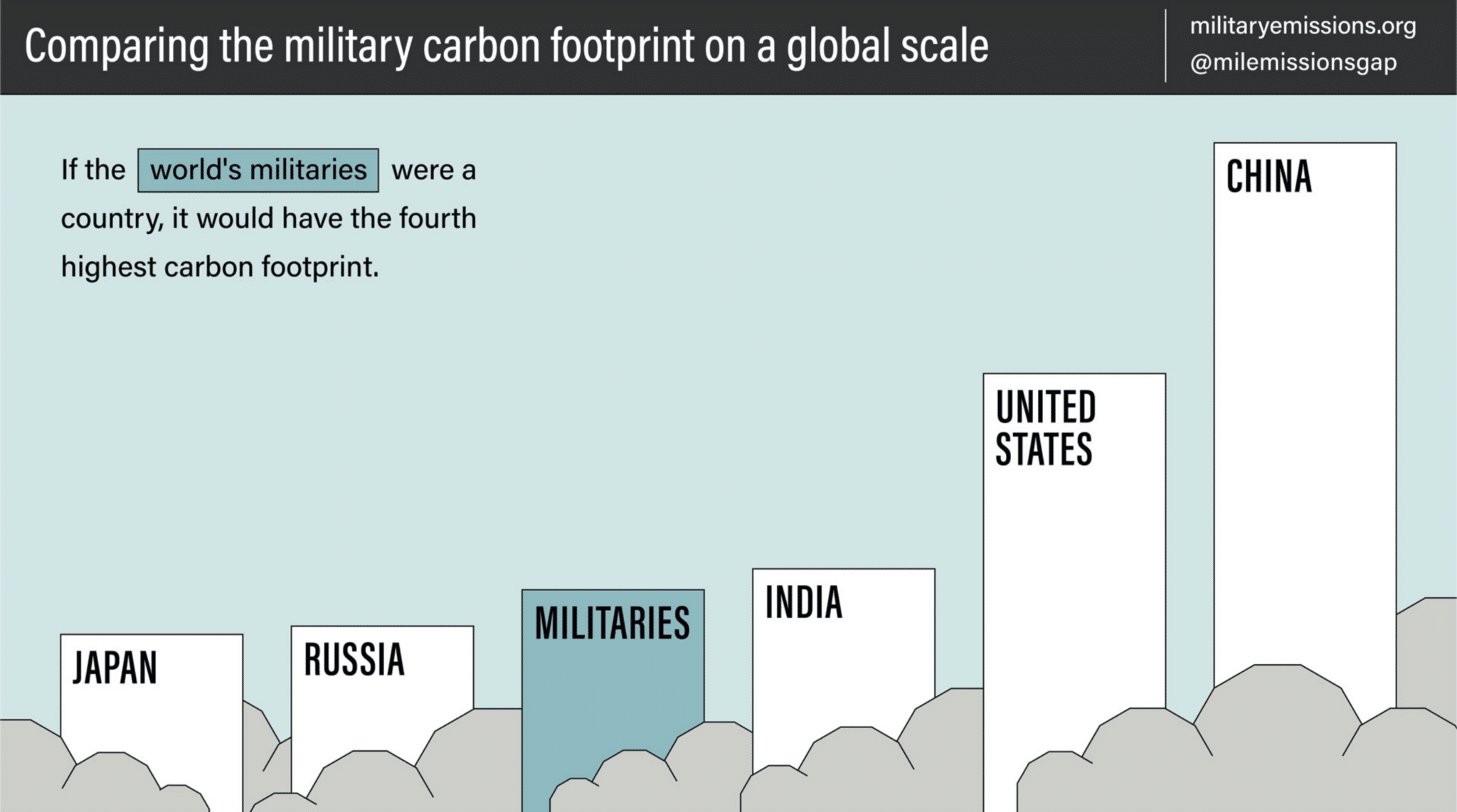Learn. Act. Pledge
Demilitarize the Skies
Around the globe, there’s war in the air. And it’s killing our planet.

Around the globe, there’s war in the air. And it’s killing our planet. As the global climate crisis comes into focus, world governments will convene events such as COP28 in Dubai this year, once again skirting around a glaring major contributor to the warming of the planet: the world’s military.
This killing machine has one of the largest carbon footprints on earth and is a major contributor to greenhouse gasses. Estimating the World’s Military Greenhouse Gas Emissions finds that “If the world’s militaries were a country, it would have the fourth highest carbon footprint,” larger than all of Russia and exceeded only by the countries of China, the United States, and India.
Global military activities such as the use of aircraft, tanks, heavy machinery and diesel power generators produce significant amounts of air pollution. Improper storage and disposal of hazardous materials such as fuels, oils, and chemicals contribute to air pollution and can contaminate the soil and groundwater and release harmful chemicals into the air.
The highest contributor to this planet-killing monstrosity is the US Military. In a recent article, Professors from Durham and Lancaster Universities state : “recent work…shows that the US military is one of the largest polluters in history, consuming more liquid fuels and emitting more climate-changing gases than most medium-sized countries. If the US military were a country, its fuel usage alone would make it the 47th largest emitter of greenhouse gases in the world, sitting between Peru and Portugal.”
In every place that CPT works—Colombia, Iraqi Kurdistan, Palestine, Turtle Island, Lesvos, the US/Mexico borderlands and elsewhere—the effects militaries have on the air and environment is a prime issue.
Taking action to end military exploitation of the planet is a critical step towards curbing the climate crisis and promoting a more sustainable and peaceful world. Learn, act and pledge to support demilitarization of the earth’s air today.

We cannot tackle the climate crisis without reducing global militarization. Will you pledge to honor the air and declare your solidarity with those fighting for climate justice?
In 2023, will you join the struggle to demilitarize the skies?
Iraqi Kurdistan
The Turkish state and NATO aircraft are contributing to air pollution in the Iraqi Kurdistan (IK) region, releasing pollutants during military operations and bombing runs, and burning large areas of land, destroying essential trees for cleaning the air. The US military’s use of depleted uranium (DU) weapons in Iraq also contributes to air pollution, potentially causing long-term health effects on civilians. The global thirst for oil and gas flaring further deteriorates air quality, and the Kurdistan Regional Government’s failure to reduce gas flaring increases the risk of fatal impacts on the civilian population. According to NASA’s research, Duhok Province is the worst area in the Middle East regarding environmental conditions, with bombings and the increasing number of oil refineries causing harm to residents. Tear gas used by the Kurdistan Regional Government during protests and demonstrations also impacts human health, wildlife, and the local ecosystem.


Turtle Island (US and Canada)
Indigenous communities fighting against oppression from extractive industries on Turtle Island are met with a militarized response from the state, resulting in air pollution from the use of tear gas and pepper spray. In Wet’suwet’en territory, constant RCMP patrols, private security company trucks, and bulldozers dismantling Land Defender camps release dust and particulate matter into the air, causing respiratory issues for nearby communities.
The Canadian and US militaries are expanding weapons manufacturing and acquisition, leading to significant environmental consequences. New US F35 Fighter Jets will contribute to global air pollution and worsen climate change when used, consuming almost 6000 liters of fuel per hour. Even during training exercises, these military crafts have devastating impacts on the enviroment.
Colombia
The military in Colombia is responsible for protecting and sustaining the oil industry. In Barrancabermeja, the largest refinery in the country is located next to a military base. CPT has been present in the area since 2001 and has witnessed the harmful effects of this partnership between the military and the oil industry on the local community. The refinery produces a significant amount of fumes and exhaust that cause irritation to the eyes and throats of residents. The city frequently experiences noxious odors, followed by announcements of chemical releases claimed to be “within acceptable levels.” Additionally, the air pollution caused by the refinery has resulted in a city-wide white mist. Many oil workers have suffered permanent health damages due to exposure to catalyst compounds released into the air under supposed “acceptable levels”.


Palestine
Israeli militarism affects every aspect of Palestinian’s lives in ways seen and unseen. One of the most pressing unseen problems in Palestine is air pollution. And a large portion of the air pollution is directly tied to Israel’s militaristic domination and expansion. The Israeli propaganda machine uses “Greenwashing” to promote the country as environmentally friendly, but in reality, Israel engages in many practices of environmental harm, which disproportionately affect the Palestinian Population.
Read CPT’s Eight major ways that Israel’s occupation worsens air pollution, specifically, for Palestinians.
Learn
World’s Military contribution to the climate crisis: Estimating the Military’s Global greenhouse Gas emissions: By Scientists for Global Responsibility (SGR) and The Conflict and Environment Observatory (CEOBS)
US Military and climate change:
The Carbon Bootprint of the Military: By Dr Stuart Parkinson, Executive Director of Scientists for Global Responsibility
Pentagon Fuel Use, Climate Change, and the Costs of War By Neta C.Crawford, Boston University
Current US Military Budget: ‘Madness’: Biden Requests Record $886 Billion Military Budget by Common Dreams
Veterans for Peace Climate Crisis and Militarism Project podcast with Jim Rine
The climate impact of Israeli Occupation of Palestine:
Read CPT’s Eight major ways that Israel’s occupation worsens air pollution, specifically, for Palestinians.
Read about the Israeli Military’s use of tear gas on Palestinian children in the most recent CPT Palestine Semester School Report
Read about Israeli government Greenwashing: Israel’s Greenwashing Campaign– The Jerusalem Fund
Watch this video about the Israeli military’s use of indirect chemical warfare in Gaza
Turkish and Iranian bombings in Iraqi Kurdistan:
Learn about the End Cross Border Bombing campaign in Iraqi Kurdistan
Turkish and Iranian bombings pollute Iraqi Kurdistan: Iraqi Civil Society Solidarity Initiative report
Act
Follow CPT online for news and action alerts: Subscribe
Commit your congregation or organization to be Apartheid-Free: Find out how.
Join and support Boycott Divestments and Sanctions(BDS)
Across Turtle Island (US and Canada):
Support Land Defenders and climate activists.
Grassy Narrows: https://freegrassy.net/
Great Plaines Action Society: https://www.greatplainsaction.org/
Resist US government militarization:
VFP Climate Crisis and Militarism website: resources and actions
Stop Cop City: https://stopcop.city/
Divest From the War Machine: resources and actions
Ground the F35s: campaign
War Tax Resistance:
$10.40 For Peace resources
National War Tax Resistance Coordinating Committee
Pledge
This year I pledge to minimize support for military exploitation of the Earth. I recognize that military activities can have significant negative impacts on the environment, particularly air pollution, and that reducing these impacts is crucial for a sustainable future.
To uphold this pledge, I will do one or more of the following actions:
» Educate myself and others about the environmental impact of military activities on air pollution and its consequences for human health and the environment.
» Refuse to support businesses or organizations that profit from military activities, such as the production of military aircraft and weaponry that contribute to air pollution.
» Advocate for policies that end militarization and prioritize the reduction of air pollution, including the development and implementation of sustainable energy alternatives.
» Support and promote initiatives and organizations that work towards reducing the impact of military activities on the environment – especially grassroots initiatives led by those most directly-affected by global militarization and the impacts on the climate in their regions.
By taking this pledge, I am committing to doing my part to reduce the environmental impact of military activities and promoting a more peaceful and sustainable future for all.

